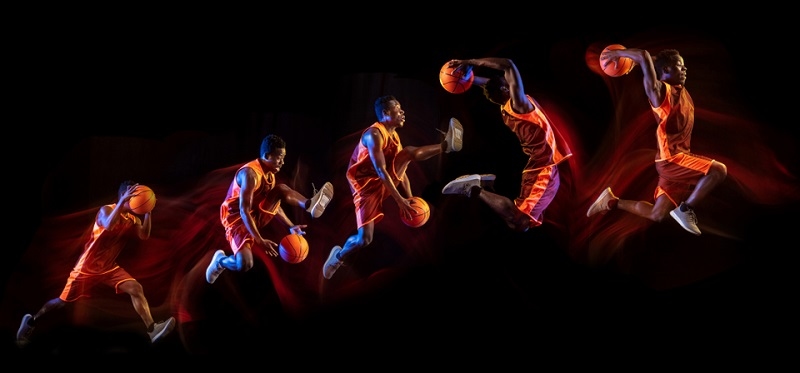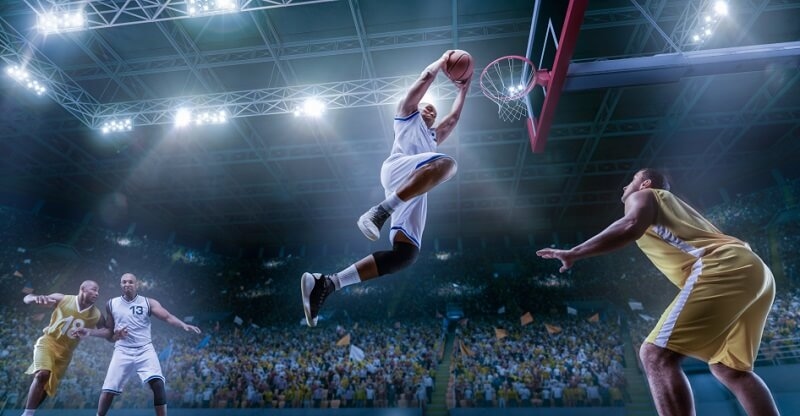
Close
Basketball is a game that demands more than just natural talent; it requires a unique blend of athleticism, precision, and relentless practice. Whether you're a seasoned pro or an aspiring player, elevating your shooting game is a continuous journey that begins with the right training regimen.
In this blog post, we'll explore a comprehensive set of training tips designed to enhance your shooting skills, build physical fitness, and optimize overall performance on the court. From targeted exercises to nutritional guidance, these insights will provide you with the tools to push your limits and excel in the game you love.

Basketball is a sport that requires agility, speed, and strength. Building athleticism is not just about quick wins or hacks; it's about meaningful activities that yield significant returns in a short time. Here's how you can elevate your athleticism as a basketball player:
Sprinting is essential in basketball, but it must be done right. Effective sprint training requires performing sprints in a "fresh" state, at maximal effort, with enough rest between sprints to maintain quality. Focus on correct sprinting mechanics rather than tiredness. This approach can make players faster without feeling gassed out.
Strength training is often underutilized in basketball, yet it's vital. Proper strength training includes exercises like squats, lunges, and deadlifts, performed 2-4 times a week. When implemented correctly, players can experience fast improvements in strength and explosiveness, even going from barely touching the rim to dunking in just weeks.
Almost a quarter of all basketball injuries are related to the foot and ankle. Dedicated foot training, including exercises like calf, raises and balance activities, can quickly improve foot function. This not only enhances performance but also reduces the risk of injuries.
These athleticism-building strategies provide a foundation for basketball players to become faster, stronger, and more resilient, contributing to an elevated shooting game and overall performance.

Basketball demands a high level of physical fitness, and specific exercises can help players get in shape to dominate on the court. Avoiding common basketball mistakes, such as improper shooting form or neglecting recovery time, is as crucial as following the right training regimen. Here's a breakdown of essential exercises:
Suicides are classic basketball drills that build endurance and agility. Players run to different lines on the court and back, increasing the distance each time. Performing 10 to 15 suicides, three to four times per week, helps players get used to running up and down the court nonstop, making quick directional pivots.
This exercise requires a partner and space to run. Players take turns sprinting to the opposite baseline and back, with three sets of 10 to 12 sprints. This drill primes players to repeatedly run the court in transitions and fast breaks.
Known as 17s, this drill improves speed in bursts. Players sprint to the opposite sideline 17 times in 70 seconds, with variations to increase intensity. It's a staple for basketball conditioning.
Exercises like the barbell military press, incline press, weighted squat jumps, and deadlifts build upper and lower body strength. These exercises focus on areas crucial for shooting, rebounding, and overall speed.
These exercises are designed to enhance a player's physical condition, focusing on stamina, agility, speed, and strength. Incorporating them into regular training routines can lead to significant improvements in on-court performance, including shooting skills.
Proper nutrition is the fuel that powers a basketball player's performance. Carbohydrates provide energy, while protein aids in building muscle. An ideal diet includes multiple servings of fruits and vegetables, whole grains, seafood, and legumes like beans. Players who train hard benefit from eating four or five meals daily, with healthy snacks like trail mix, yogurt, fruit, and energy bars. Keeping overall fat intake low ensures that the body is fueled efficiently.
Rest is as vital as training and diet in a player's regimen. Dedication to rest days, one or two per week, allows the body to recover from intense workouts. During this off time, damaged muscles heal, and energy reserves replenish. Proper rest also lessens the chances of overtraining, which can lead to injury, fatigue, and even depression.
Together, nutrition and rest form a critical part of a basketball player's training program. A balanced diet ensures that players have the energy and strength they need to excel on the court, while adequate rest helps in recovery and injury prevention. By paying attention to these aspects, players can elevate their shooting game and overall performance, ensuring that they are always ready to give their best.
Embracing these tips to improve basketball skills not only enhances your shooting game but also develops overall agility, strength, and court awareness.
Achieving basketball shape doesn't necessarily require a gym or court; it can be accomplished at home with determination and creativity. Here's how:
Home training offers flexibility and convenience, allowing players to work on their game without the need for specialized facilities. By leveraging available resources and maintaining a committed approach, players can elevate their shooting game and overall basketball skills, even from the comfort of their homes.
You may also like: The Key Basketball Positions In NBA You Should Know
Basketball is a multifaceted sport that requires a blend of skill, strength, agility, and discipline. From targeted exercises to build stamina and speed to essential nutritional guidelines and practical home training tips, this guide offers a comprehensive approach to elevating your shooting game. Whether you're a beginner or an experienced player, implementing these strategies can lead to significant improvements on the court.
Remember, consistent effort and a holistic approach to training are key to success. Embrace these tips, stay committed to your goals, and watch your basketball skills soar to new heights. Happy training!
This content was created by AI